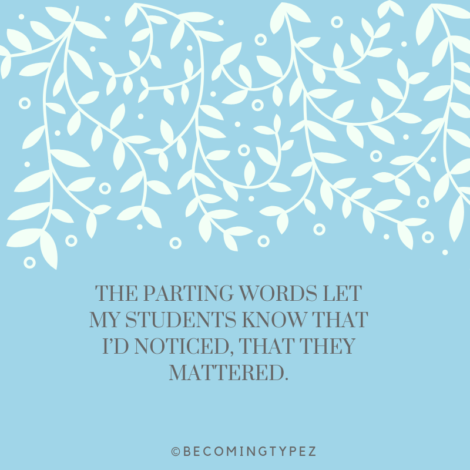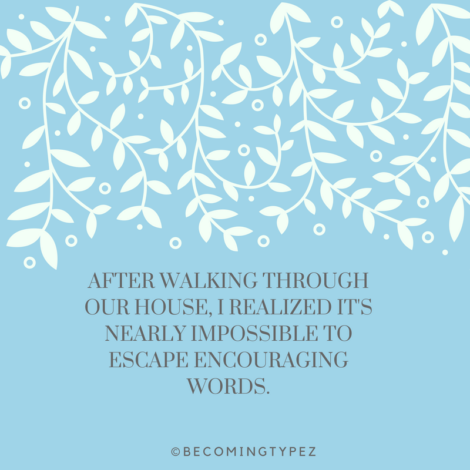 I stood at the dismissal door waving, a smile on my face. “Have a great weekend! See you Tuesday!” I was exhausted, yet exhilarated. Like always, the first few days had flown by and life had shifted into high gear. I knew my students were tired, too. Because the first few days of school are hard. Adjusting to a new grade, new expectations, and a new teacher takes a lot of energy. As I sent my students home for the long weekend, I wanted my them to leave feeling happy, cared for, excited for what’s yet to come. And I wanted them to know they would be welcomed enthusiastically when they returned.
I stood at the dismissal door waving, a smile on my face. “Have a great weekend! See you Tuesday!” I was exhausted, yet exhilarated. Like always, the first few days had flown by and life had shifted into high gear. I knew my students were tired, too. Because the first few days of school are hard. Adjusting to a new grade, new expectations, and a new teacher takes a lot of energy. As I sent my students home for the long weekend, I wanted my them to leave feeling happy, cared for, excited for what’s yet to come. And I wanted them to know they would be welcomed enthusiastically when they returned.
Educators and parents alike know how important the start of each new school year is. The first few days are critical. We have a few days to get things right, set the stage for what’s to come. That’s why huge chunks of time are dedicated to creating a classroom community and establishing routines. Routines, we know, not only maximize student learning, but they promote feelings of safety and security as our students learn what to expect at various times, while learning what is expected of them.
In and out of the classroom I embrace routine. Because there are so many “have tos” and “want tos” in life but a finite number of hours. Established routines help us use the precious commodity time efficiently, allocate minutes and hours, use them mindfully. And one of the most precious of minutes in our school day, in my opinion, is dismissal.
As adults, we’re all familiar with the phrase, “famous last words.” Many of us can quote final lines from favorite movies and books. Likewise, lots of us can conjure memories of parting words from people who mattered; a special neighbor, a dear school friend, a family member who really understood us, a parent. Their words left an imprint. Most of us can name a teacher who made a lasting impression on us too, because of something they said in parting.
When my girls were little, there never seemed to be enough time. Our morning routine followed Swiss clock precision. The moment the alarm clock buzzed Monday through Friday, each minute was accounted for. My kids quickly learned that there was no “being late to school,” no dawdling. Each morning as I headed out the door, I called, “Be good today. Learn lots. I love you.” On good mornings, when all ran smoothly, my goodbye was sing-songy. On bumpy mornings…not so much. The words blended into one. Regardless the delivery, I wanted my girls to hear the same message: have fun, make friends, be happy, be curious, engaged, ask questions, persevere when things get hard and remember, you are loved.
Day after day, my children heard the same thing. Three simple phrases, intentionally crafted and communicated. Be good. Do good. Love you. It was our goodbye ritual. Which I believe set them up for a great day.
When they left for college, my girls each established a phone routine with my husband and me. We could look forward to Friday night phone calls from our younger daughter, Saturday morning from our elder. They filled us in on highlights from their weeks, successes and struggles. As each conversation came to a close, I made sure to end with an encouraging word, an acknowledgement of effort, an I love you. With my children hours away, I rediscovered the incredible power of our parting words.
 This made me rethink classroom dismissal. Dismissal was my least favorite time of the day. It was often rushed, hectic. But understanding the power of parting words, I knew there was room for improvement in my dismissal process. Didn’t I want my students to leave feeling positive about the work they’d done? Acknowledged for the contributions they’d made? Excited to return? Of course, I did. So, I revised my farewell. “Good night. You did great work today. See you tomorrow.”
This made me rethink classroom dismissal. Dismissal was my least favorite time of the day. It was often rushed, hectic. But understanding the power of parting words, I knew there was room for improvement in my dismissal process. Didn’t I want my students to leave feeling positive about the work they’d done? Acknowledged for the contributions they’d made? Excited to return? Of course, I did. So, I revised my farewell. “Good night. You did great work today. See you tomorrow.”
Like the ritual I’d established with my own two children, the good bye I said to each of my students at dismissal time carried meaning. I wished them fun, happiness, had noticed their efforts and let them know I was looking forward to seeing them again the next day. Simple phrases that packed a lot of meaning. And for the kids who had a not-so-great day? Well, I’ve adapted a favorite line from one of my favorite picture books, Lily’s Purple Plastic Purse, by Kevin Henkes. “I know today was difficult. Tomorrow will be better.” I love these words because of their directness; reassurance that mistakes are expected and accepted, the promise of a brand new day to try again.
I realized that it took seconds to wish every child a good night, provide personalized encouragement, share a smile as they filed past. The parting words let my students know that I’d noticed, that they mattered. These positive feelings carry over into the next day and the day after that, creating an environment of trust and risk-taking. What a gift.
©Kathie Z.

